University Auditing Report: Ethical Considerations in Finance
VerifiedAdded on 2021/12/28
|6
|1150
|54
Report
AI Summary
This auditing report analyzes a case involving financial irregularities within a company, focusing on the ethical dilemmas faced by an auditor, Janice. The report details the facts of the case, identifying key stakeholders such as Janice, the CFO, the General Manager, and the company, Pet Plus Pty Limited. It highlights the major ethical issues, including financial fraud and the auditor's responsibility to report misconduct. The report applies relevant ethical principles from APES 110, such as integrity, professional competence, and professional behavior, to evaluate four alternative courses of action. It assesses the consequences of each alternative, ultimately recommending that Janice report the fraud to internal and external auditors to ensure compliance with ethical standards and protect her job. The report concludes with a discussion of the ethical decision and its rationale, referencing relevant literature on business ethics and auditing.

Running head: AUDITING
Auditing
Name of the Student
Name of the University
Author’s Note
Auditing
Name of the Student
Name of the University
Author’s Note
Paraphrase This Document
Need a fresh take? Get an instant paraphrase of this document with our AI Paraphraser
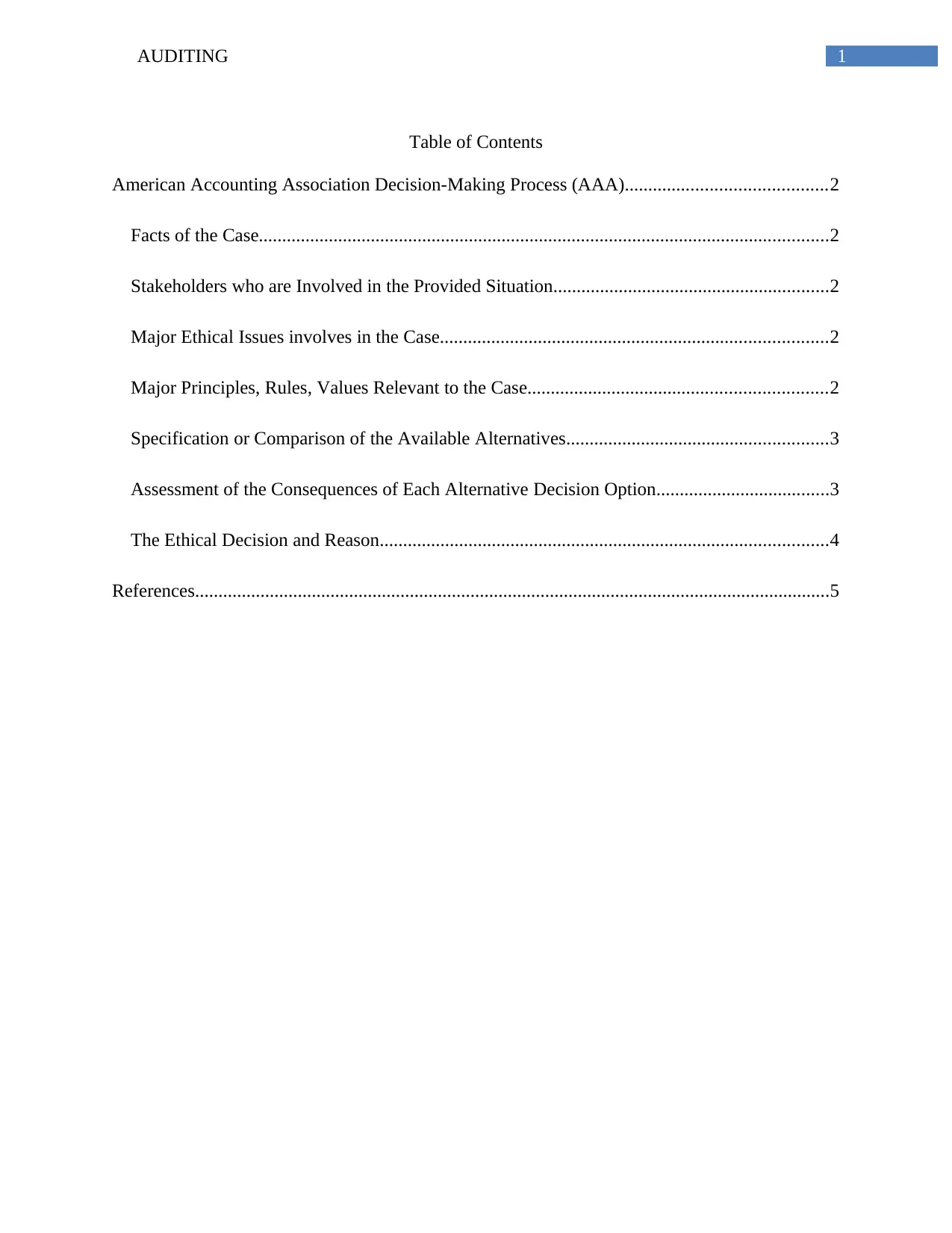
1AUDITING
Table of Contents
American Accounting Association Decision-Making Process (AAA)...........................................2
Facts of the Case..........................................................................................................................2
Stakeholders who are Involved in the Provided Situation...........................................................2
Major Ethical Issues involves in the Case...................................................................................2
Major Principles, Rules, Values Relevant to the Case................................................................2
Specification or Comparison of the Available Alternatives........................................................3
Assessment of the Consequences of Each Alternative Decision Option.....................................3
The Ethical Decision and Reason................................................................................................4
References........................................................................................................................................5
Table of Contents
American Accounting Association Decision-Making Process (AAA)...........................................2
Facts of the Case..........................................................................................................................2
Stakeholders who are Involved in the Provided Situation...........................................................2
Major Ethical Issues involves in the Case...................................................................................2
Major Principles, Rules, Values Relevant to the Case................................................................2
Specification or Comparison of the Available Alternatives........................................................3
Assessment of the Consequences of Each Alternative Decision Option.....................................3
The Ethical Decision and Reason................................................................................................4
References........................................................................................................................................5
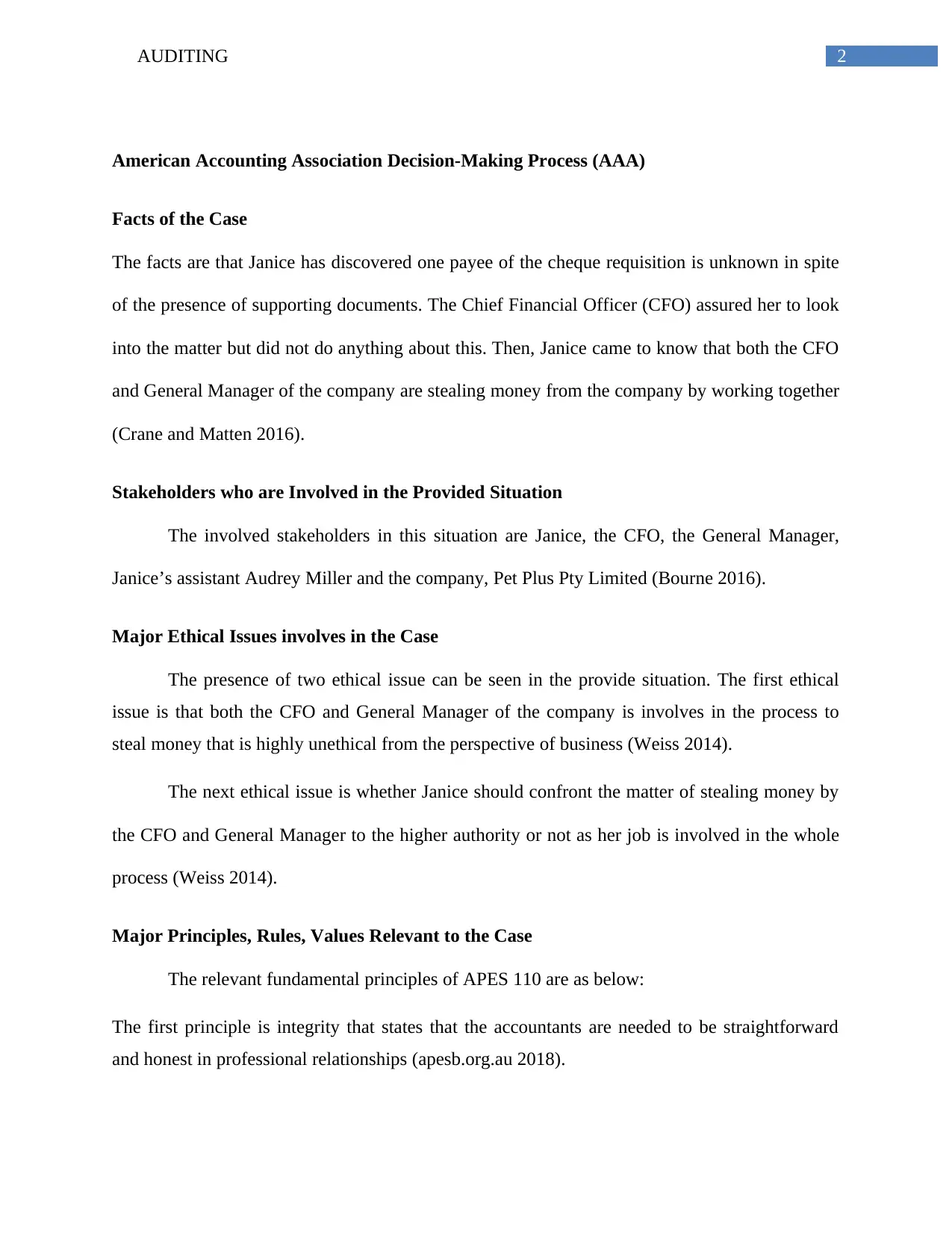
2AUDITING
American Accounting Association Decision-Making Process (AAA)
Facts of the Case
The facts are that Janice has discovered one payee of the cheque requisition is unknown in spite
of the presence of supporting documents. The Chief Financial Officer (CFO) assured her to look
into the matter but did not do anything about this. Then, Janice came to know that both the CFO
and General Manager of the company are stealing money from the company by working together
(Crane and Matten 2016).
Stakeholders who are Involved in the Provided Situation
The involved stakeholders in this situation are Janice, the CFO, the General Manager,
Janice’s assistant Audrey Miller and the company, Pet Plus Pty Limited (Bourne 2016).
Major Ethical Issues involves in the Case
The presence of two ethical issue can be seen in the provide situation. The first ethical
issue is that both the CFO and General Manager of the company is involves in the process to
steal money that is highly unethical from the perspective of business (Weiss 2014).
The next ethical issue is whether Janice should confront the matter of stealing money by
the CFO and General Manager to the higher authority or not as her job is involved in the whole
process (Weiss 2014).
Major Principles, Rules, Values Relevant to the Case
The relevant fundamental principles of APES 110 are as below:
The first principle is integrity that states that the accountants are needed to be straightforward
and honest in professional relationships (apesb.org.au 2018).
American Accounting Association Decision-Making Process (AAA)
Facts of the Case
The facts are that Janice has discovered one payee of the cheque requisition is unknown in spite
of the presence of supporting documents. The Chief Financial Officer (CFO) assured her to look
into the matter but did not do anything about this. Then, Janice came to know that both the CFO
and General Manager of the company are stealing money from the company by working together
(Crane and Matten 2016).
Stakeholders who are Involved in the Provided Situation
The involved stakeholders in this situation are Janice, the CFO, the General Manager,
Janice’s assistant Audrey Miller and the company, Pet Plus Pty Limited (Bourne 2016).
Major Ethical Issues involves in the Case
The presence of two ethical issue can be seen in the provide situation. The first ethical
issue is that both the CFO and General Manager of the company is involves in the process to
steal money that is highly unethical from the perspective of business (Weiss 2014).
The next ethical issue is whether Janice should confront the matter of stealing money by
the CFO and General Manager to the higher authority or not as her job is involved in the whole
process (Weiss 2014).
Major Principles, Rules, Values Relevant to the Case
The relevant fundamental principles of APES 110 are as below:
The first principle is integrity that states that the accountants are needed to be straightforward
and honest in professional relationships (apesb.org.au 2018).
⊘ This is a preview!⊘
Do you want full access?
Subscribe today to unlock all pages.

Trusted by 1+ million students worldwide
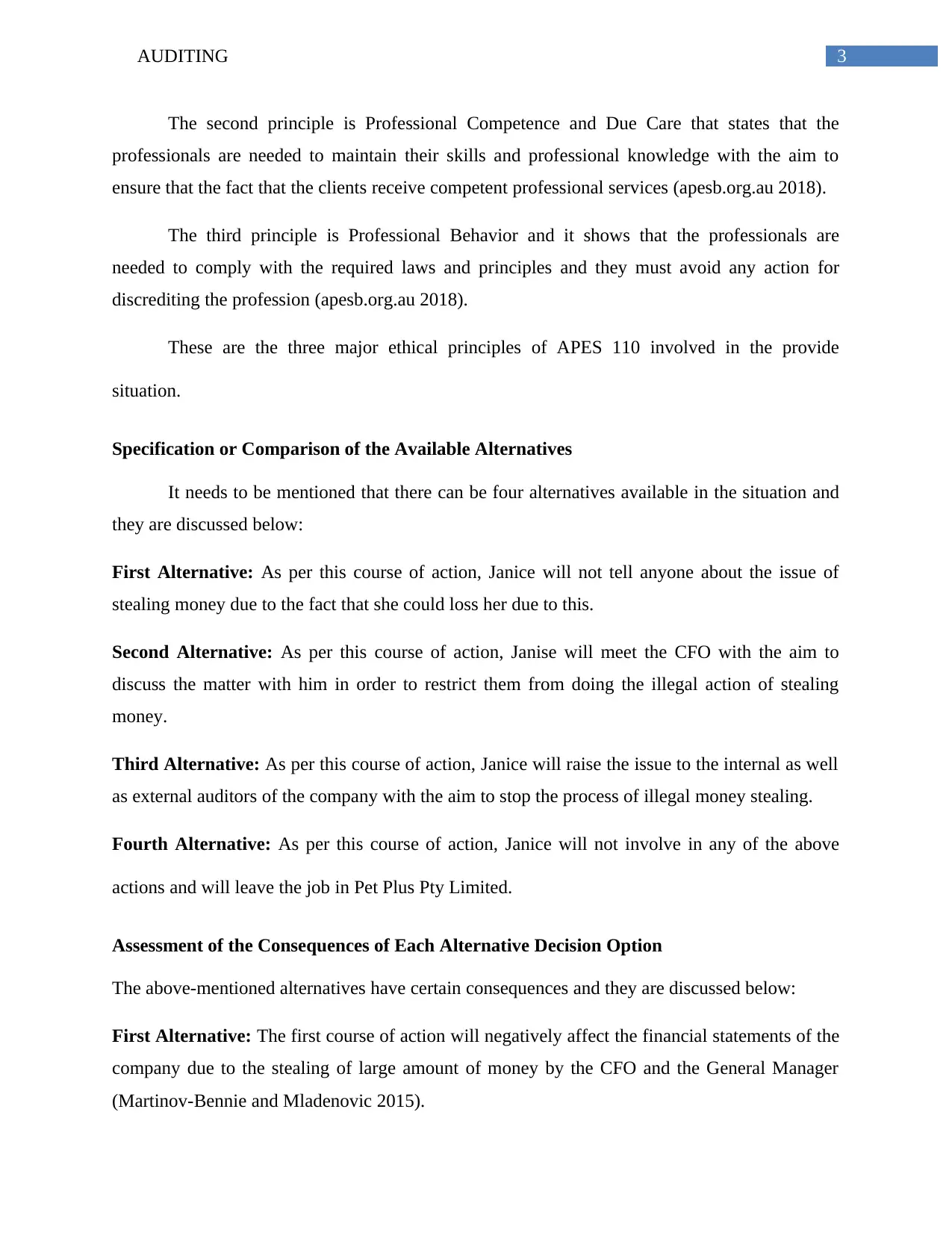
3AUDITING
The second principle is Professional Competence and Due Care that states that the
professionals are needed to maintain their skills and professional knowledge with the aim to
ensure that the fact that the clients receive competent professional services (apesb.org.au 2018).
The third principle is Professional Behavior and it shows that the professionals are
needed to comply with the required laws and principles and they must avoid any action for
discrediting the profession (apesb.org.au 2018).
These are the three major ethical principles of APES 110 involved in the provide
situation.
Specification or Comparison of the Available Alternatives
It needs to be mentioned that there can be four alternatives available in the situation and
they are discussed below:
First Alternative: As per this course of action, Janice will not tell anyone about the issue of
stealing money due to the fact that she could loss her due to this.
Second Alternative: As per this course of action, Janise will meet the CFO with the aim to
discuss the matter with him in order to restrict them from doing the illegal action of stealing
money.
Third Alternative: As per this course of action, Janice will raise the issue to the internal as well
as external auditors of the company with the aim to stop the process of illegal money stealing.
Fourth Alternative: As per this course of action, Janice will not involve in any of the above
actions and will leave the job in Pet Plus Pty Limited.
Assessment of the Consequences of Each Alternative Decision Option
The above-mentioned alternatives have certain consequences and they are discussed below:
First Alternative: The first course of action will negatively affect the financial statements of the
company due to the stealing of large amount of money by the CFO and the General Manager
(Martinov-Bennie and Mladenovic 2015).
The second principle is Professional Competence and Due Care that states that the
professionals are needed to maintain their skills and professional knowledge with the aim to
ensure that the fact that the clients receive competent professional services (apesb.org.au 2018).
The third principle is Professional Behavior and it shows that the professionals are
needed to comply with the required laws and principles and they must avoid any action for
discrediting the profession (apesb.org.au 2018).
These are the three major ethical principles of APES 110 involved in the provide
situation.
Specification or Comparison of the Available Alternatives
It needs to be mentioned that there can be four alternatives available in the situation and
they are discussed below:
First Alternative: As per this course of action, Janice will not tell anyone about the issue of
stealing money due to the fact that she could loss her due to this.
Second Alternative: As per this course of action, Janise will meet the CFO with the aim to
discuss the matter with him in order to restrict them from doing the illegal action of stealing
money.
Third Alternative: As per this course of action, Janice will raise the issue to the internal as well
as external auditors of the company with the aim to stop the process of illegal money stealing.
Fourth Alternative: As per this course of action, Janice will not involve in any of the above
actions and will leave the job in Pet Plus Pty Limited.
Assessment of the Consequences of Each Alternative Decision Option
The above-mentioned alternatives have certain consequences and they are discussed below:
First Alternative: The first course of action will negatively affect the financial statements of the
company due to the stealing of large amount of money by the CFO and the General Manager
(Martinov-Bennie and Mladenovic 2015).
Paraphrase This Document
Need a fresh take? Get an instant paraphrase of this document with our AI Paraphraser
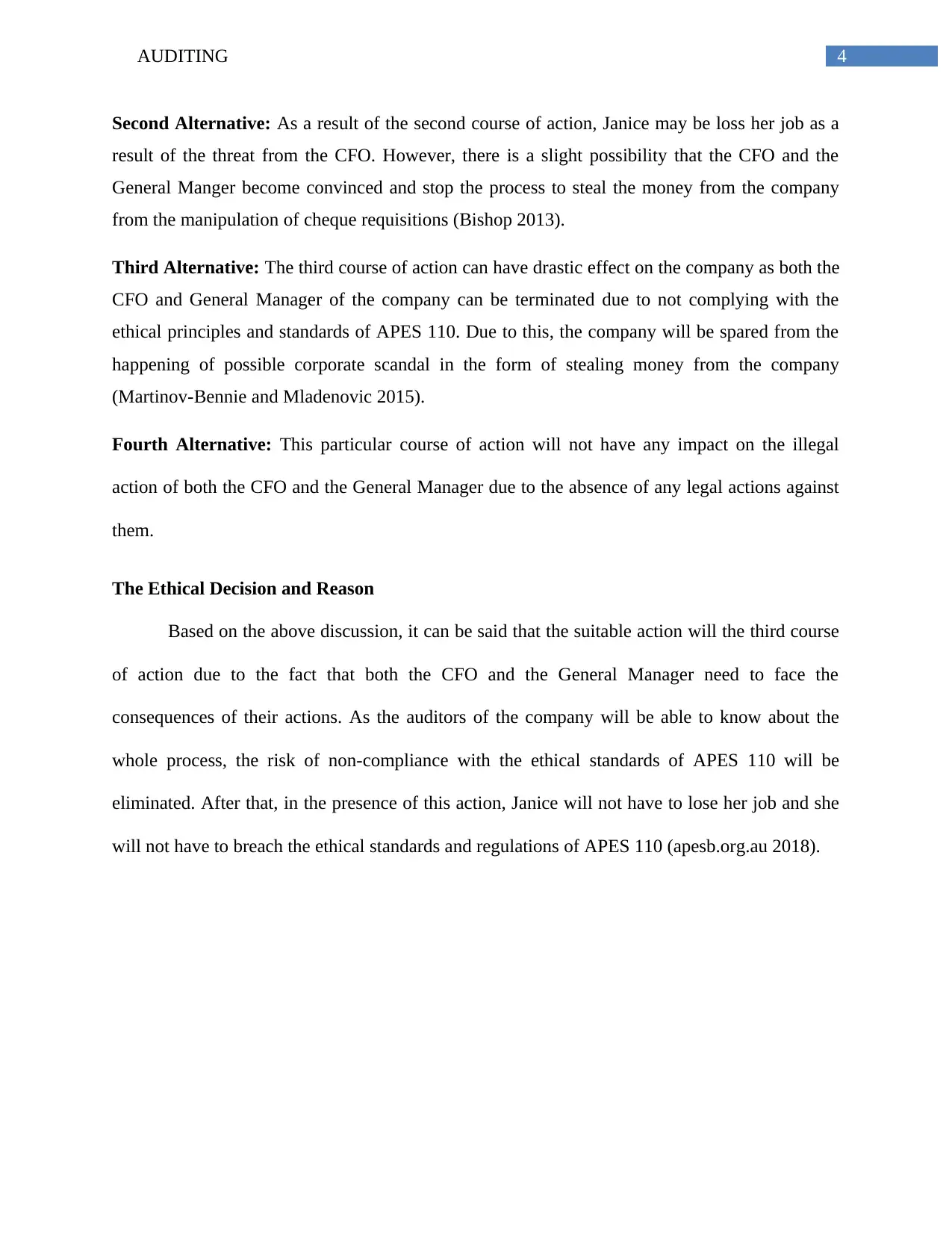
4AUDITING
Second Alternative: As a result of the second course of action, Janice may be loss her job as a
result of the threat from the CFO. However, there is a slight possibility that the CFO and the
General Manger become convinced and stop the process to steal the money from the company
from the manipulation of cheque requisitions (Bishop 2013).
Third Alternative: The third course of action can have drastic effect on the company as both the
CFO and General Manager of the company can be terminated due to not complying with the
ethical principles and standards of APES 110. Due to this, the company will be spared from the
happening of possible corporate scandal in the form of stealing money from the company
(Martinov-Bennie and Mladenovic 2015).
Fourth Alternative: This particular course of action will not have any impact on the illegal
action of both the CFO and the General Manager due to the absence of any legal actions against
them.
The Ethical Decision and Reason
Based on the above discussion, it can be said that the suitable action will the third course
of action due to the fact that both the CFO and the General Manager need to face the
consequences of their actions. As the auditors of the company will be able to know about the
whole process, the risk of non-compliance with the ethical standards of APES 110 will be
eliminated. After that, in the presence of this action, Janice will not have to lose her job and she
will not have to breach the ethical standards and regulations of APES 110 (apesb.org.au 2018).
Second Alternative: As a result of the second course of action, Janice may be loss her job as a
result of the threat from the CFO. However, there is a slight possibility that the CFO and the
General Manger become convinced and stop the process to steal the money from the company
from the manipulation of cheque requisitions (Bishop 2013).
Third Alternative: The third course of action can have drastic effect on the company as both the
CFO and General Manager of the company can be terminated due to not complying with the
ethical principles and standards of APES 110. Due to this, the company will be spared from the
happening of possible corporate scandal in the form of stealing money from the company
(Martinov-Bennie and Mladenovic 2015).
Fourth Alternative: This particular course of action will not have any impact on the illegal
action of both the CFO and the General Manager due to the absence of any legal actions against
them.
The Ethical Decision and Reason
Based on the above discussion, it can be said that the suitable action will the third course
of action due to the fact that both the CFO and the General Manager need to face the
consequences of their actions. As the auditors of the company will be able to know about the
whole process, the risk of non-compliance with the ethical standards of APES 110 will be
eliminated. After that, in the presence of this action, Janice will not have to lose her job and she
will not have to breach the ethical standards and regulations of APES 110 (apesb.org.au 2018).
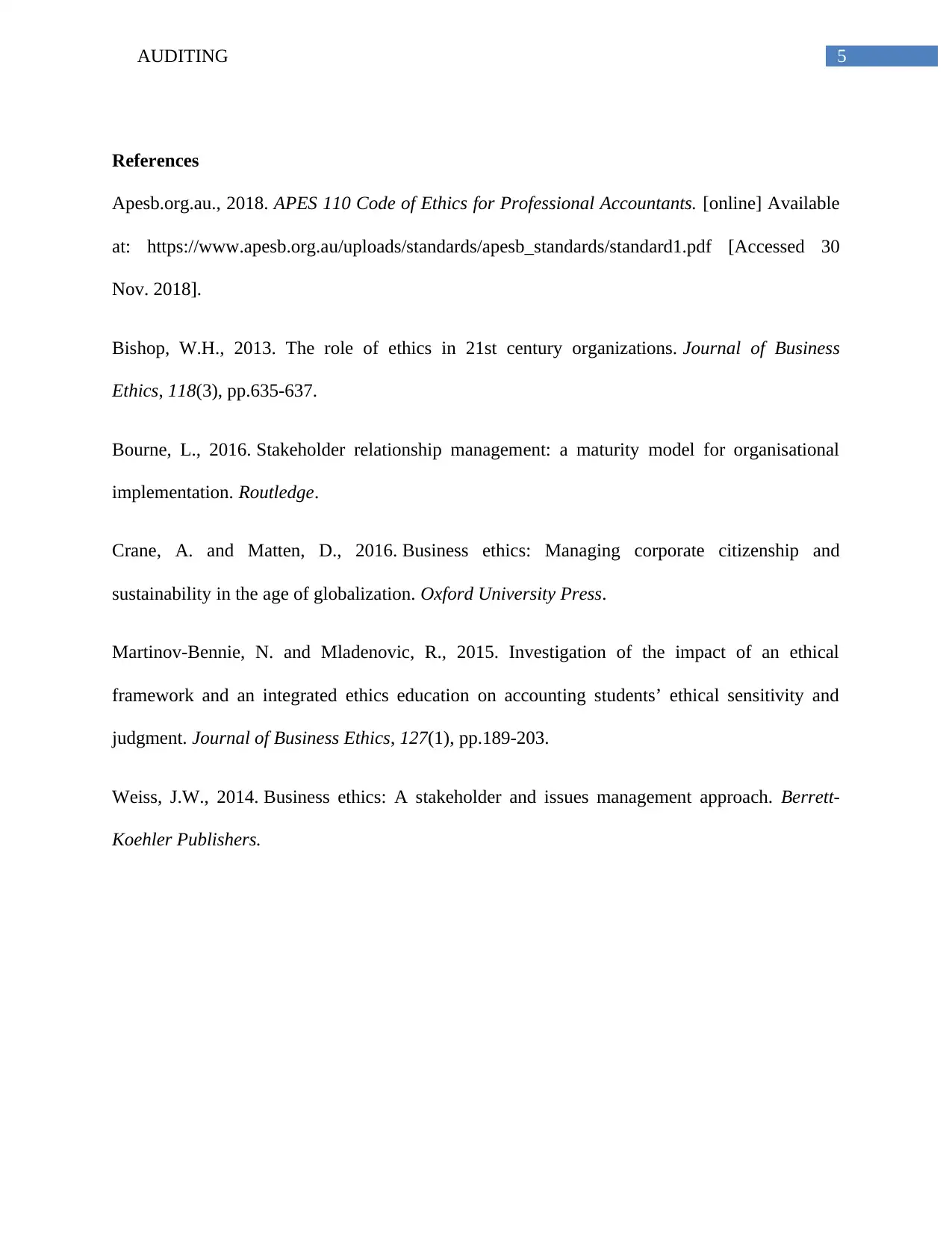
5AUDITING
References
Apesb.org.au., 2018. APES 110 Code of Ethics for Professional Accountants. [online] Available
at: https://www.apesb.org.au/uploads/standards/apesb_standards/standard1.pdf [Accessed 30
Nov. 2018].
Bishop, W.H., 2013. The role of ethics in 21st century organizations. Journal of Business
Ethics, 118(3), pp.635-637.
Bourne, L., 2016. Stakeholder relationship management: a maturity model for organisational
implementation. Routledge.
Crane, A. and Matten, D., 2016. Business ethics: Managing corporate citizenship and
sustainability in the age of globalization. Oxford University Press.
Martinov-Bennie, N. and Mladenovic, R., 2015. Investigation of the impact of an ethical
framework and an integrated ethics education on accounting students’ ethical sensitivity and
judgment. Journal of Business Ethics, 127(1), pp.189-203.
Weiss, J.W., 2014. Business ethics: A stakeholder and issues management approach. Berrett-
Koehler Publishers.
References
Apesb.org.au., 2018. APES 110 Code of Ethics for Professional Accountants. [online] Available
at: https://www.apesb.org.au/uploads/standards/apesb_standards/standard1.pdf [Accessed 30
Nov. 2018].
Bishop, W.H., 2013. The role of ethics in 21st century organizations. Journal of Business
Ethics, 118(3), pp.635-637.
Bourne, L., 2016. Stakeholder relationship management: a maturity model for organisational
implementation. Routledge.
Crane, A. and Matten, D., 2016. Business ethics: Managing corporate citizenship and
sustainability in the age of globalization. Oxford University Press.
Martinov-Bennie, N. and Mladenovic, R., 2015. Investigation of the impact of an ethical
framework and an integrated ethics education on accounting students’ ethical sensitivity and
judgment. Journal of Business Ethics, 127(1), pp.189-203.
Weiss, J.W., 2014. Business ethics: A stakeholder and issues management approach. Berrett-
Koehler Publishers.
⊘ This is a preview!⊘
Do you want full access?
Subscribe today to unlock all pages.

Trusted by 1+ million students worldwide
1 out of 6
Related Documents
Your All-in-One AI-Powered Toolkit for Academic Success.
+13062052269
info@desklib.com
Available 24*7 on WhatsApp / Email
![[object Object]](/_next/static/media/star-bottom.7253800d.svg)
Unlock your academic potential
Copyright © 2020–2026 A2Z Services. All Rights Reserved. Developed and managed by ZUCOL.





